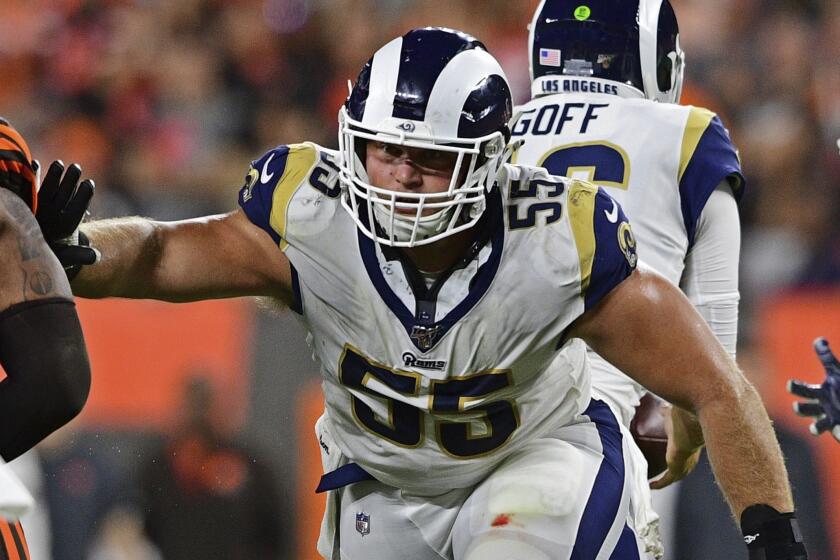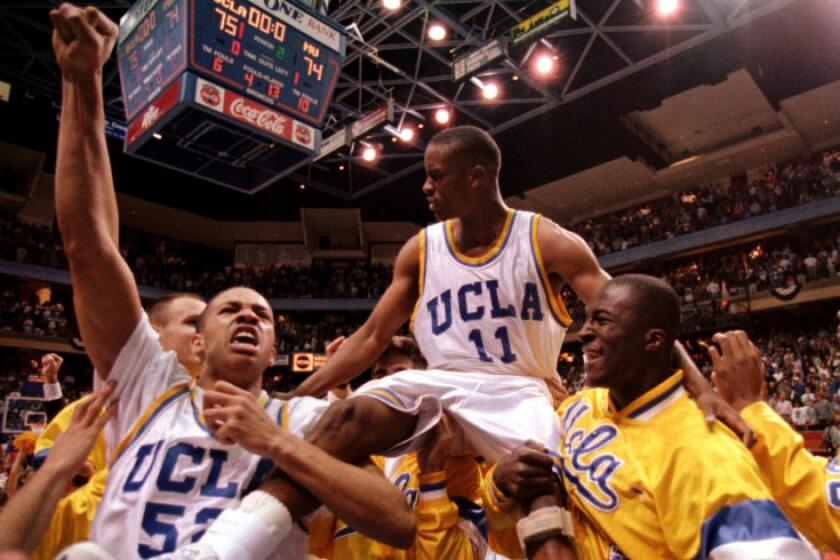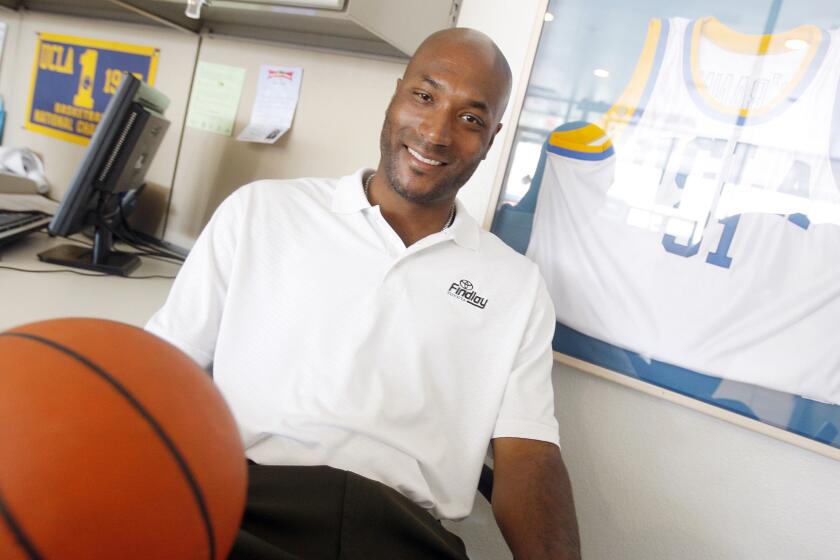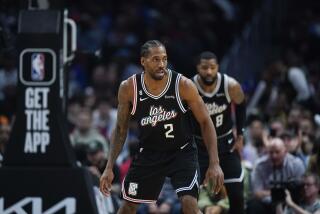This day in sports: Lew Alcindor ends his UCLA career in fitting fashion
Polio, like COVID-19, was a rampant and contagious disease, widely present in the United States and countries in Western Europe in the first half of the 20th century.
Children and young people were its most vulnerable victims, and three well-known sports figures contracted it at an early age. They were Olympics swimming champion Johnny Weissmuller, Heisman Trophy winner Pete Dawkins and golf great Jack Nicklaus.
Weissmuller got polio at 9. He took up swimming as part of his rehabilitation therapy and the treatment was the beginning of a championship career. Weissmuller won five gold medals and one bronze in the 1924 and 1928 Olympics. He would later star in several “Tarzan” movies.
Dawkins was diagnosed with polio at 11. But aggressive physical treatment helped him recover. He was selected the best player in college football in 1958 at Army, and other honors included earning consensus All-America status and capturing the Maxwell Award. He didn’t play in the NFL but attended Oxford as a Rhodes Scholar, followed by careers in the military and in business.
A look at athletes, coaches and others in the sports world who have tested positive of the coronavirus.
Nicklaus contacted polio at 13, a year before the Jonas Salk vaccine was made available in the mid-1950s.
Nicklaus remembers his muscles feeling stiff and his joints aching. Over a two-week period, he said, “I lost my coordination and 20 pounds.
“I recovered after a few weeks but my joints have gotten awfully sore at times.”
He holds the record for most victories in major tournaments.
In sports events canceled by the current pandemic, the Lakers would continue their road schedule today at Detroit.
And, winners in the second round of the NCAA basketball tournament would advance to the Sweet 16.
Here is a look at memorable games and outstanding sports performances on this date:
1932 — The blue lines are eliminated and the center red line is used to determine offsides in an experiment by the NHL. With both teams out of playoff contention, the league tries it in a game between the New York Americans and Boston Bruins. New York wins 8-6.
1958 — Vern Hatton scores 30 points and Johnny Cox scores 24 to lead Kentucky 84-72 over Seattle in the NCAA basketball final. The Wildcats, referred to as “fiddlers, not violinists” by coach Adolph Rupp, erase an 11-point deficit when Don Mills scores to give Kentucky a 61-60 lead with six minutes to go. Elgin Baylor, playing with injured ribs, leads the Chieftains with 25 points and 19 rebounds.
1969 — Lew Alcindor scores 37 points to lead UCLA to the NCAA men’s basketball title with a 97-72 win over Purdue. Alcindor, who in 1971 changed his name to Kareem Abdul-Jabbar, also grabs 20 rebounds in his last college game. John Vallely contributes 15 points for the Bruins and Rick Mount scores 25 for the Boilermakers.
The most iconic shot in UCLA history — by Tyus Edney with 4.8 seconds left in a 1995 March Madness game — originated on a makeshift driveway court.
1969 — West Chester State beats Western Carolina 65-39 to win the first women’s collegiate national championship. The game is played using a six-player format at the Pennsylvania school’s Hollinger Field House. The tournament, which consisted of 16 teams, many from Division I schools, ran three days and was the forerunner to the NCAA women’s national tournament.
1986 — Trevor Berbick wins a unanimous 15-round decision over Pinklon Thomas in Las Vegas for the World Boxing Council heavyweight title. Berbick’s reign as champion, though, was short because he would lose the title to Mike Tyson later in the year. The Jamaican was the last boxer to fight Muhammad Ali, defeating him in 1981.
1994 — The NFL announces the addition of the two-point conversion, the league’s first scoring change in 75 seasons. The American Football League had used the two-point rule from 1960 until the AFL merged with NFL after the 1969 season, although the rule did not carry over.
1997 — Tara Lipinski, who could perform the cleanest and surest jumps in women’s figure skating, becomes, at 14, the youngest to win the women’s world championship, at Lausanne, Switzerland.
2013 — Florida Gulf Coast, a school so new it wasn’t eligible for the NCAA men’s tournament until 2012, upsets second-seeded Georgetown 78-68 in the second round of the South Regional at Philadelphia. The Eagles, coached by Andy Enfield, use a 21-2 second-half run to pull away from the Hoyas and hold on in the final minute to become the seventh No. 15 seed to beat a No. 2. Sherwood Brown scores 24 points and Bernard Thompson scores 23 for Florida Gulf Coast. The Eagles beat San Diego State in the second round for a trip to the Sweet 16, and in April, Enfield is hired by USC as coach.
A look at the players and coaches from UCLA’s 1995 NCAA men’s basketball championship team and what they are up to today.
2017 — Marcus Stroman takes a no-hitter into the seventh inning, Ian Kinsler hits a two-run home run and the United States beats Puerto Rico 8-0 to win its first World Baseball Classic in four tries.
2017 — Russell Westbrook records his 35th triple-double of the season with 18 points, 11 rebounds and 14 assists as Oklahoma City cruises to a 122-97 win over Philadelphia. Westbrook, who made all six of his field-goal attempts and all six of his free throws, is the first NBA player to have a triple-double without missing a field-goal attempt or free throw.
Sources — Los Angeles Times and Associated Press
More to Read
Go beyond the scoreboard
Get the latest on L.A.'s teams in the daily Sports Report newsletter.
You may occasionally receive promotional content from the Los Angeles Times.













